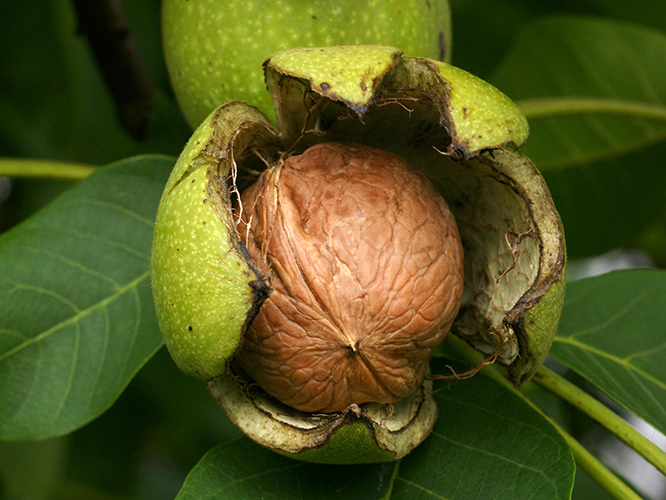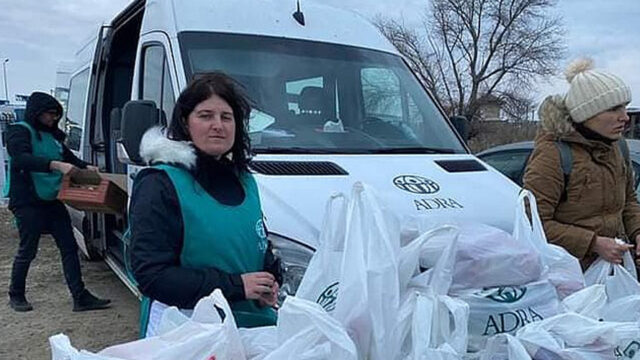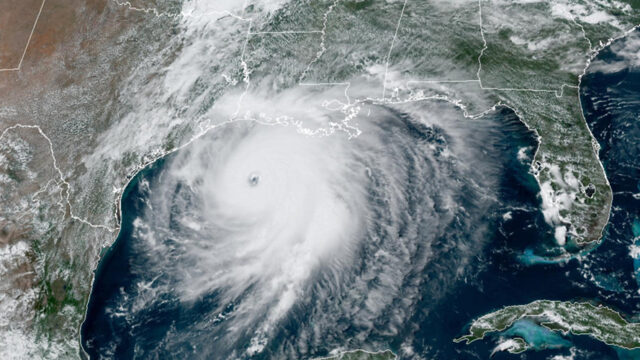The faithfulness of a tree that bore fruit in good years and bad taught me something about my husband.

For several years my husband and I shared an English walnut tree with our next-door neighbors. It straddled our mutual lot line, so we also shared the cost of maintenance. One year, for the first time in 12 years, we shared the walnuts. Why, you might wonder, if we shared the tree for all those years, had we not shared the harvest? Ah, therein (with apologies to Shakespeare) lies a tale.
Looking Forward to the Harvest
We moved to our home in eastern Washington in the winter of 1998. A big selling point for our purchase was an attached garage. Another was a wonderful, enormous English walnut tree that would, in summer, shade the entire west side of our new abode. My husband was delighted at the thought of a walnut harvest the following year, and I had no problem with the prospective shade.
As summer approached and the tree leafed out, it fully met our expectations of shade. When autumn arrived with its shower of walnuts accumulating on the lawn, my husband was out there with his pails and arthritic back, joyfully gathering them. Our neighbor at the time was a single working mom of a teenage son with no interest in picking up walnuts or sharing the harvest. So my husband had them all to himself, which suited him just fine.
He covered old cookie sheets with walnuts, lined them up on shelves to dry in the garage, then, everyevening through the winter, happily banged them open one by one with a hammer, extracted the golden meats, and tenderly filled gallon-size plastic zipper bags with the tasty result of his labors. We had walnuts for cooking, for baking, and, of course, for sharing with friends and neighbors.
That winter, new neighbors moved in, and when the next autumn arrived, they shared the gathering and the harvest. Then disaster struck. The squirrel-filled trees and the meadow east of our housing community were commandeered by a contractor who bulldozed the land and the trees in order to build a new housing development. Hundreds of squirrels, their habitat destroyed, took up residence in the yards of our community. Dozens found all the food they could eat in our walnut tree, attacking the walnuts as they formed, cutting them from their moorings, and devouring them before they could even mature.
And if that weren’t enough, our tree became infested with walnut husk flies—nasty little varmints that destroyed what few walnuts the squirrels left. We called pest control services to spray our tree, hoping to secure a harvest the following year, but it was not to be. Each year passed with the crop either eaten by squirrels or made inedible for humans by the husk fly.
The Arrival of Winter
Meanwhile, my husband’s health began to fail. Within a few short years he was no longer able to gather the walnuts, or to husk and shell them if they should miraculously become available again. He spent his days in his recliner in the corner of our living room, where the big window gave him a view of the yard and his beautiful tree. There he sat, shielded from the heat of the sun by its bountiful shade in summer, warmed by the gold of its leaves in autumn, and comforted by memories of his Montana mountain childhood when sparkling snow dressedits bare branches in winter.
One fall, my husband died without having a chance to enjoy again a crop of walnuts from his beloved tree. Then, the next October, something unexpected happened. Walnuts—ripe, healthy, tanned, and lovely—began falling from our tree. Because the squirrels had begun devouring our neighbors’ grapes, the neighbors began using live traps to capture the little rascals and transport them to a new habitat far from human competition. Then, when walnuts began to form, our tree was relatively squirrel-free, which gave the nuts opportunity toripen at their leisure.
One Friday night in mid-October, our first windstorm of the season resulted in a carpet of walnuts all over our yard. On Sunday my neighbor and I went out to harvest them and found them in such pristine condition that we had a hard time harnessing our enthusiasm.
What happened? We don’t know. Maybe the life cycle of the walnut husk fly that was causing the damage to the fruit of the tree was finally broken because squirrels were no longer attacking the walnuts in their pubescent state. Whatever the cause, we had a bumper crop—our first in 12 years.
Now, as I shell walnuts to make banana bread, wielding the hammer as carefully as my husband did to avoid crushing the meats, Psalm 1:3 comes to mind: “That person is like a tree planted by streams of water, which yields its fruit in season, and whose leaf does not wither—whatever they do prosper” (NIV). I realize that my husband was like that tree.
As the walnut tree had faithfully borne fruit for so many years, so had my husband faithfully served His Lord all his life. When the tree was stricken by forces that destroyed its fruit, it still provided a shield from the heat of the sun, spiritual warmth by the gold of its leaves, and comfort by the beauty of the snow on its branches. Likewise my husband, when he was no longer physically able to minister to the needs of his family and others, continued to provide a spiritual shield for his family with his unwavering faith, offered warmth and comfort for his caregivers when he smiled, shook their hands and said “thank you” and “God bless you” as they finished their tasks each day.
One of his young caregivers was new on the job and still learning techniques. My husband was patient with him and always expressed appreciation for his efforts. This young man told me that he was so impressed with my husband’s attitude and love for the Savior that he decided to start going back to church. When the young man made his last visit and found my husband gone, tears flowed and he again expressed appreciation for the godly man he felt privileged to have had as a client. I see him in church with his little boy nearly every week.
Just as the walnut tree was attacked and afflicted for a time but not destroyed, my husband was afflicted by the enemy of souls and unable to bear fruit for a season. But like the tree, he did not perish. In the resurrection he will once again flourish and “bring forth abundantly”—this time for eternity.








